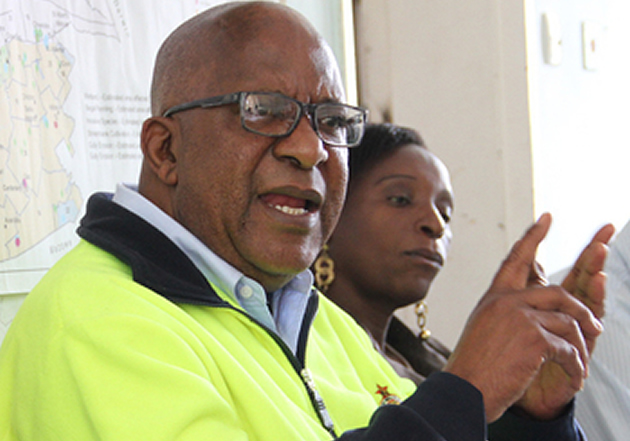The Interview: CPU ready to deal with disasters: Boss


Civil Protection Unit director Mr Madzudzo Pawadyira (left) speaks to The Herald during a tour of flood-hit areas in Mashonaland Central this week
Heavy rains have pounded most parts of Zimbabwe since the Christmas holidays causing flooding. The floods have killed 10 people and left hundreds of people homeless in addition to destroying vital infrastructure in different parts of the country particularly in Mashonaland Central and Mashonaland West. Herald Reporter Petros Zivengwa (PZ) caught up with Civil Protection Unit Director Mr Madzudzo Pawadyira (MP) to talk about the country’s preparedness to deal with floods and other disasters.
PZ: In the past the Civil Protection Unit has been found wanting when it comes to disaster management preparedness. Is the department equipped to deal with cases of flooding this year?
MP: I don’t agree with that statement in the first place. We have never been found wanting. The preparations for Civil Protection Unit are always up to date. The problem is we are not just a response department. We plan throughout the year. Every year, we get in touch with the communities in certain identified flood-prone areas such as Muzarabani, Gokwe North and South, Middle Sabi, the Beitbridge area, Chiredzi and Tsholotsho. We went there, having been informed by the long-range weather forecast that we will be having normal to above normal rainfall, and we made appropriate plans.
So the planning has not been found wanting at all. What is obtaining on the ground is that the country does not have enough resources to be deployed in a department when there is no disaster.
At the moment as it is, the country is even struggling to pay some allowances and salaries to civil servants as a whole. So it is the problem of cash which should not be mistaken for poor planning. The planning is there but the money is not there.
PZ: Has the CPU issued enough flood and safety alerts in the high risk areas? And if so, are the people in the areas heeding the message?
MP: Yes, we did. We issued warning to the areas that I indicated before. We even included areas like Manicaland because the province has been receiving a little bit more rainfall than is normal. People in these flood- prone areas have responded well. The only problem is that the flooding that we are experiencing today is occurring in areas which have not recorded high rainfall in living memory. When you ask people, even the old generation, they are saying they have never seen such amounts of rainfall in the areas experiencing floods today. Because our predictions were informed by previous experiences it has been difficult to plan for areas in Mashonaland West.
In the Muzarabani area, the problems are structural in that the infrastructure, the bridges and roads in the area, have been neglected over time and this is becoming more evident. The houses which are collapsing are a direct result of poor workmanship and building materials that were used during construction. They are no clay soils for baking bricks so they use the adobe type of bricks which are sun dried, and these succumb very easily to high moisture content.
PZ: How does your department work, for instance, in the case of floods where thousands of people are left without food and shelter? Who do you work with and who does what?
MP: What we normally do is that the first to respond are councils who have responsibility to look after people. But we realise that most councils are in dire straits and as a result we then marshal resources through the plans that we have because we do have standing arrangements and standing plans with humanitarian agencies such as IOM, Red Cross and other non-governmental organisations who form the larger part of civil protection in Zimbabwe. So they are part and parcel of Government plans. It’s not unusual, even if you go to other countries where they have disasters occurring, these humanitarian agencies are there and specifically work with Government so that we can provide for the requirements. Government will always be there and will bankroll the major part of the intervention programmes.
PZ: Who do you work with and who does what?
MP: We work with all Government ministries and all specialised agencies. We also involve the parastatals and the private sector in our planning and implementation. This is a standing arrangement, through what we call a platform system. And at the national level we do have the national platform which involves all these agencies that I have been talking about. We have at provincial level an equal amount of planning although it depends on the availability of those specialists, resources and agencies at that level. At the district level it is also a reflection of what is going on at the centre. However, you will find that certain districts have got fewer members than you would get at the national level.
PZ: What efforts are there to ensure that people move from these flood-prone areas to higher ground so that Government does not lose money evacuating the same people annually?
MP: That is easier said than done. We have indicated that Muzarabani is no place for people. But up to now we cannot and we have to live with the reality that we will never be in a position to decamp that area. What we can do is to work with the realities on the ground that certain people, like in Muzarabani, are a large community and they cannot all be moved out. However, we plan with them so that they themselves, with our department and the civil protection, in general, identify areas of higher ground. In Muzarabani, the land is 125 metres to 136 metres above sea level, the ground is literally flat. So we then identify areas what locals know as higher ground and with them plan that people move to a higher ground when there is flooding. What is happening in Muzarabani is militating against the plan, because the people till and occupy the land away from higher ground. When the rains come the rivers quickly fill up, Musengezi and its tributaries, then people cannot move to higher ground.
There has been a footbridge that has been planned for the area, one which has been established by Red Cross Society of Zimbabwe is already there but there is one that Government is planning to build so that we increase the escape routes from the low- lying areas to higher ground. People are supposed to self evacuate before we bring in expensive gear like helicopters and other means of moving people.
PZ: Generally, how much would you need as a department at any given period to assist in the event of floods?
MP: Assuming that Government is going to undertake most if not all roles that we require, I will give the example of Tokwe- Mukosi, with all the assistance put together, it came to about US$5 million. We plan on a budget of US$3,5 million. That was the amount that we feel comfortable with and then other agencies and individuals can come and complement what we will have been given.
PZ: How has been the funding like during the past years and which areas do you think need more funding?
MP: The funding was miserably low. We did not get much in the sense of funding from Treasury. We were operating on shoestring budget which then was complemented by a donation of about half a million United States dollars from the Chinese government. Together we had a cash injection of about US$650 000 which we use for our response services. The funding that we need is in different aspects, we cannot go on responding ad infinitum year in and year out, what we require is to have a combination of response and pre-planning. Pre-planning is in terms of money we require immediately to enter into all communal lands and teach people about disaster preparedness. We have come out with a model of a disaster risk reduction which is what we are using for training people at the community level and training institutions. We are also leading in the training of NGOs and other agencies so that we speak with same diction and we don’t confuse people. It is an ongoing programme and as we get money, we move from district to district training people. Our thrust at the moment is on those areas that are perennially giving us problems. The training has been taking place in there but it needs to be widened. If you go looking for money for prevention, you will find that very few people want to assist. What people want to do is to concentrate on disaster response. I am not looking down upon the response elements but I am saying that your dollar goes a longer way if we put it disaster risk reduction measures.
PZ: What challenges have you been facing in trying to assist people struck with disasters such as floods and droughts?
MP: Once people are already in a disaster situation, it becomes a response issue. The response issue must be understood in terms of what we are trying to do. What we do as the first line of response is to do the search and rescue person. Once we rescue the people and relocate them to a safer ground from where we will give them necessary comfort like food, shelter and non-food items some of which will have been destroyed by the flooding. Beyond that we then scale down so that the ministries responsible for development come in now and take over. My department does not ordinarily deal with developmental programmes. If it’s something that we find that the bridges are damaged, we simply indicate to the active and responsible authorities for them to repair the bridges and the roads. If it’s water we rope in the water department whom we are planning and working with even during the rescue mission. If it’s health issues, the Ministry of Health and Child Care takes over and so on. Some people think that we ought to carry on at that period which is unfortunately not the case, going into other people’s mandate.
PZ: What has been the major disaster in the history of Zimbabwe and what were the casualty figures?
MP: The cholera outbreak in 2008 was the biggest disaster. We lost about 4 000 people. It was the most unfortunate. Although the response was well organised and planned but where you lose such a number of people it leaves one with a sour taste in the mouth.
PZ: What advice would you give to the general public on how best they can save themselves from disasters especially floods?
MP: People should listen to what the experts say, people should also attend disaster risk reduction workshops which are conducted and those meetings should be attended by all political leaders so that they propagate the information to their communities and then the people become wise. There are does and don’ts which are communicated in our pamphlets. We got some designed for the rainy season and some designed for the dry season. Those information fliers are available at district level and we would want the people to read them. If it’s to do with flooding the locals know their own topography and they should self relocate before outsiders come to help.









Comments